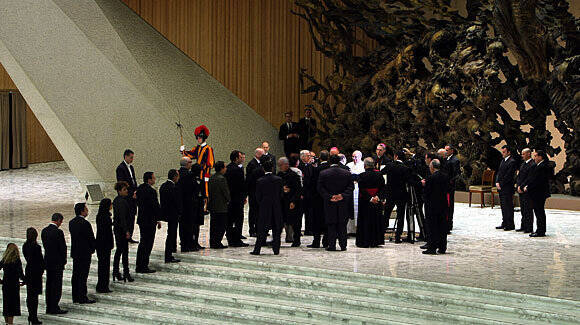Cambridge, MA. As Rachel Donadio wrote today in the New York Times, Pope Francis made a small and sensitive gesture today that might bode well for a fresh relationship with people of other faiths and none. In his conversation with journalists – see the whole of his remarks here – he concludes with a blessing, and comment (in Spanish, it seems) on the blessing:
[In Italian:] “I commend you to the intercession of the Blessed Virgin Mary, Star of Evangelization, and with cordial good wishes for you and your families, each of your families. I cordially impart to all of you my blessing. Thank you.
[In Spanish:] “I told you I was cordially imparting my blessing. Since many of you are not members of the Catholic Church, and others are not believers, I cordially give this blessing silently, to each of you, respecting the conscience of each, but in the knowledge that each of you is a child of God. May God bless you!”
This is interesting not only because he extends his blessing to all present — he is surely not the first Pope to do that – but because he takes a moment to make explicit that he is doing this, that he is “cordially” reaching out to people of other faiths and to those who do not believe, that in recognizing them as such, he is “respecting the conscience of each,” and that he does this not apart from but in the presence of “Mary, Star of Evangelization” (and, I would guess, with her approval, since she most likely would not link evangalization to stinginess in blessings).
Let us hope that this is a sign of things to come, after a very long era of different sensitivities. Ever since Joseph Ratzinger became head of the Congregation of the Doctrine of the Faith in 1981 and thereafter Pope, he had an extraordinarily large role to play in how the Church – the official Church – characterized its relationship to people not belonging to the Church; his intelligent but fixed, cautious, and seemingly unevolving perspective branded even the papacy of John Paul II with worry and caution and warning.
[In English:] Enough.
Now that Joseph Ratzinger's era - as cardinal, as pope - is finally over, there is room for fresh voices, instincts, and ideas. Pope Francis, like any Jesuit, will be his own man, but let us hope for new ways and new sensitivities in addressing the mysteries and realities of God that still, all the more, surround us even after these past 30 years.







